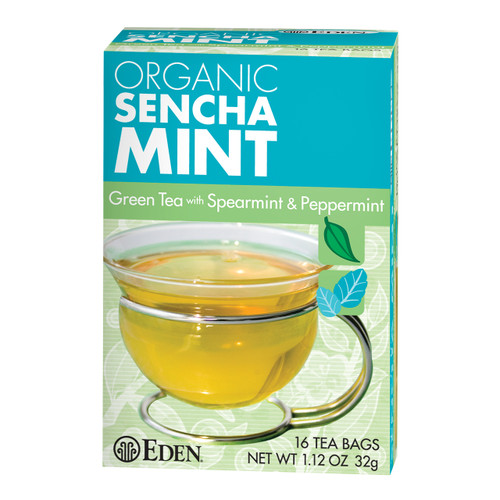Hand picked early spring green tea leaves, organic sencha, steamed and twice rubbed to capture its cherished green, aroma and flavor. Research affirms its beneficial properties. Polyphenol antioxidant tannins, flavonoids, and EGCG, collectively called catechins, make up 40% of green tea's dry weight. A profound, loose leaf green tea providing the experience sought by green tea aficionados the world over. Relaxing yet uplifting and quite delightful. 41% less caffeine than brewed coffee. ![]()
MORE DETAILS
Organic Eden Sencha Green Tea is made from the prized, tender spring leaves. The freshly picked leaves are immediately and gently steamed, rubbed into thin curls while warm, slowly dried in gas fired rotating ovens, allowed to cool, and then immediately packaged to seal in its fresh flavor and aroma. Soothing sencha, more than any other tea, has the fresh flavor of just picked tea leaves. Rubbing the leaves preserves beneficial antioxidants as well as the deep emerald green color of the leaves that release their unique flavor and delightful aroma when steeped. These time consuming techniques have been known for centuries to be essential in providing the experience sought by tea lovers the world over. Eden Organic Sencha Green Tea is a beautiful light green when steeped, and contains 41 percent less caffeine than regular brewed coffee.
All true teas stem from the plant Camellia sinensis, an attractive perennial shrub about five feet tall with gentle rounded leaves and tender twigs. Tea becomes green, black, or other varieties depending upon the time of harvest, and the way it is cured and handled. Tea begins to oxidize as soon as it is picked. Chinese and English teas allow oxidation to proceed as they dry, but with Japanese green tea, oxidation is skillfully halted by the steaming and rubbing process. Revered for over 4,000 years as a medicinal herb in China, the tea bush was introduced to Japan in 1191 and quickly became the national beverage respectfully called 'o-cha', meaning honorable tea.
Eden Sencha is organically grown on remote, centuries old tea plantations of Uji, Japan by the Nagata family. In early spring Uji farmers cover their plants with dark netting or traditional woven bamboo screens to protect the first tender young leaves from the harsh rays of the afternoon sun. Most farmers process these first spring leaves into 'gyokuro' (jewel tea), Japan's rarest, most expensive tea, and the one used to make ceremonial, matcha powdered green tea. Unlike most farmers, the Nagatas process their first, most prized leaves into Sencha. While most tea farmers spray their plants with chemicals fifteen to twenty times per year, the Nagata family has rejected chemical agriculture completely. They do not use animal manure, chemical fertilizers, herbicides, or pesticides and replenish nutrients in their soil only with vegetable quality compost. The Nagatas are somewhat of a curiosity to the neighboring tea farmers. Their plants are not overly protected and pampered, and are allowed to grow according to their own pattern. Although they harvest slightly less tea than those using the pampered and chemical methods, their tea plants produce tea for twice as long a period of time. Chemically grown plants burn out in about twenty years, but the Nagata plants commonly produce for forty years, and some for as long as one hundred years. The Nagata family has supplied natural food shops around the world with organic sencha and other organic teas since 1974.
Uji is the historical name for the surrounding districts near and including the ancient capitals of Nara and Kyoto. It is here that the Buddhist priest Myo-e planted Uji's first tea shrubs in 1221 to meet the growing demand for green tea. This area is considered to be the birthplace of Japan's green tea, and is famous for producing the best quality green tea there. Tea from this area is so highly regarded that it is respectfully referred to as Uji-cha (tea from Uji). Uji's rich, slightly acidic soil is ideal for growing tea bushes; and the early morning mist from the Uji river that winds through the valleys and surrounding hillsides, moistens the leaves of the plants and shields them from the sun. Uji's landscape is quilted with acres of centuries old tea fields.
The flavor of tea reflects the soil it is grown in, the season picked, and the curing process. Eden Sencha is tended adhering to strict organic practices. The Nagatas are dedicated to organic farming. This dedication is also reflected in the use of skillfully executed traditional handling methods that preserve and enhance the tea's flavor and antioxidant nutrients resulting in exceedingly fine organic green tea.
Green tea has been the focus of medical research in many countries over the past decade. These studies affirm green tea's beneficial properties. Antioxidants, including epigallocatechins gallate, tannins and flavonoids, all collectively referred to as 'catechins' are cited. These polyphenols account for up to 40 percent of the tea's dry weight.
To brew loose Eden Sencha Tea, place 1 teaspoon in a small teapot. Bring 1 cup water almost to a boil, pour over leaves, cover and steep 2 minutes or so. Boiling water and over steeping are not recommended. Strain to remove leaves.
Organic Eden Traditional Teas contain no added flavorings or dyes, and are not processed using any additives whatsoever.











